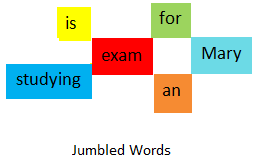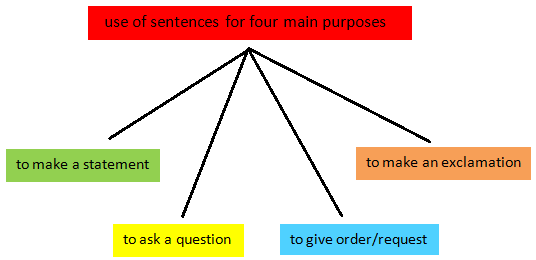The Sentence
What is a sentence?
A sentence is a group of words that is arranged so as to make a complete sense.
i.e., when a group of words sitting in a proper way expresses a certain meaning then it is called sentence.
As for example:
1. Truth triumphs all.
2. Fat is a great factor.
3. Time tells everything.
4. Payout is ready for devil.
5. God is good.
Let us look at this group of jumbled words to understand about the sentence.
Rearrange these jumbled words in different order to form a complete sense.
Now, the same group of six words makes complete sense. Such a group of words is called sentence.
Remember:
A sentence always begins with a capital letter.
A sentence ends with a full stop (.), a question mark (?) or an exclamation mark (!).
A sentence
may be single worded or multi–worded. It is because while we are writing we
use many words but when we are speaking
we often use single word. Sometimes we use verb less word or group of words for
verbal communication. A sentence may not denote a complete sense as a sentence
may be changed into big from small.
For example:
(i) A man is eating.
(ii) A thin man is eating.
(iii) A thin man is eating banana in his breakfast.
If we
discuss comparative literature, we see that in Sanskrit grammar a sentence has
three parts. These are – desire, eligibility and position.
For example:
(i) A man is walking.
(ii) A man’s desire is walking.
(iii) He can walk it is his eligibility.
These words are placed in a balanced manner it is its position.
Single worded word: come, go, hold.
Multi-worded:
(i) Who is she? (with verbs)
(ii) Nita Singh (verb less).
Sentence has certain characteristics:
1. A sentence has two parts-naming part and telling part.
2. A sentence denotes a complete meaning.
3. Sentence may be big or small.
4. Every sentence’s beginning is capital letter. It should end with a full stop (.).
5. Sentence’s I is always capital.
6. A pronoun’s first letter is always capital.
7. According to English grammar the words should be arranged in a proper way.
Read the following groups of words:
1. Go.
In this sentence, even one word makes a sentence.
2. Write, Elizabeth.
In this sentence, two words also make a sentence.
3. Elizabeth writes well.
In this sentence, three words make a sentence.
4. What does Elizabeth write?
In this sentence, four words make a sentence.
5. Elizabeth pen with writes.
In this sentence, four words do not make a sentence.
Group of word or words from sentence 1 to 4 make complete sense. Hence these are termed as sentence.
Group of words in sentence 5, does not make complete sense. Hence these are Jumbled Words so these words are not put in their proper order.
Kinds of sentences:
There are four kinds of a sentence:
1. Assertive sentences
2. Interrogative sentences
3. Imperative sentences
4. Exclamatory sentences
Now we will discuss about assertive sentences, interrogative sentences, imperative sentences and exclamatory sentences along with the examples.
Assertive sentences:
A sentence that says or states something is known as assertive sentence or declarative sentence. An assertive sentence can either be affirmative or negative.
For example:
1. We play badminton in the evening.
2. She likes coffee.
3. Lady Gaga sings well.
Note: We put a full stop (.) at the end of an assertive sentence.
Interrogative sentences:
A sentence that asks a question is known as interrogative sentence.
For example:
1. What is your name?
2. Is everything ready?
3. Did you finish your homework?
Note: We put a question mark (?) at the end of an interrogative sentence.
Imperative sentences:
A sentence that expresses a command, a request or an advice is known as imperative sentence.
For example:
1. Show me your homework.
2. Always speak the truth
3. Give me a pencil, please.
Note: We put a full stop (.) at the end of an imperative sentence.
Exclamatory sentences:
A sentence that expresses some strong feeling is known as exclamatory sentence.
For example:
1. What a grand building!
2. How nice you are!
3. What a lovely flower it is!
Note: We put an exclamation mark (!) at the end of an exclamatory sentence.
English Grammar and Composition
From The Sentence to HOME PAGE
Recent Articles
-
Plants Around Us | Big & Small Plants | Shrubs & Herbs | Water Plants
Feb 03, 26 02:01 AM
We see different types of plants around us. Plants are living things. They breathe and grow. They also reproduce. Most of the plants grow on land. Some plants grow in water. -
Formed Elements of Blood | Erythrocytes | ESR |Leukocytes |Neutrophils
Jan 15, 26 01:25 AM
Formed elements formed elements are constitute about 45 % of blood afeias haematocrit value packed cell volume mostly of red blood corpuscles and are of 3 types- erythrocytes, leukocytes and blood pla… -
What Is Plasma? | Blood Plasma | Proteins | Nutrients | Cholesterol
Nov 07, 25 10:29 AM
Blood is a mobile fluid which is a connective tissue and is derived from the mesoderm like cell any other connective tissue. Colour of blood is reddish and that flows inside the blood vessels by means… -
Disorders of Respiratory System | Tuberculosis | Pleurisy | Emphysema
Oct 28, 25 11:39 PM
Tuberculosis is very common disease and is caused by a type of bacteria called Mycobacterium tuberculosis. This disease causes different trouble in the respiration and infection of several parts of th… -
Regulation of Respiration | Respiratory Centres | Inspiratory Area |
Oct 14, 25 12:13 AM
Respiratory Centre is the area that controls the rate of respiration and it is observed to be located in medulla oblongata and pons. Respiratory Centre has the following will dispersed components like…








New! Comments
Have your say about what you just read! Leave me a comment in the box below.